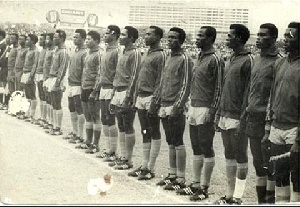There is a local football tale almost as old as the Ghanaian game itself.
Now, whoever spun this story must have had quite a fertile imagination, for virtually every boy who grew up in Ghana in a certain era (this writer included, and probably yourself as well, if you are not too embarrassed to admit it) gobbled it up with wide-eyed boyish curiosity - every surreal bit of it.
It is the tale narrating the fictional football match between Ghana and India. The one that ended 100-1 to the latter yet saw the former run out as 'winners'. Depending on which account one is more familiar with, there are quite a few variations. The core of the story, though, remains fairly consistent.
So, then, here goes this intriguing fable as most of us heard as toddlers.
Ghana played India at an unknown venue and on a similarly obscure date - I am as oblivious to those details as you most likely are - and, somehow, the latter ended up scoring a hundred goals in 90 minutes; again, please don't ask me how, for I know the answer no more than you do.
Or, well... perhaps I could attempt explaining the 'how' part as best as my infantile mind could comprehend at the time.
According to the intricacies of the legend, the Indians were aided by certain mythical forces that were apparently potent enough to transform the ball into all sorts of formidable beings/objects - from ferocious beasts (including a three-headed lion), through blazing fire, to spiky chunks of palm fruit - so fearful that the Ghanaian goalkeeper could only watch helplessly as these whizzed past him only to nestle in the twine in the form of footballs - all one hundred of them.
There was some respite for Ghana, though, when the team was granted a penalty right at the end of the game. A certain Shamo Quaye (other versions mention the deceased silky Ghanaian winger Baba Yara instead, the bullet-footed Wilberforce Mfum or alternatively, the mystery fellow whose image graces the 'Milo' beverage container) stepped up in spite of threats from the opposition of regrettable repercussions if he dared strike the ball.
The Ghanaians apparently mourned their departed comrade all the way to the cemetery, while the Indians left the pitch the very way they entered it: through a bottle placed in the centre-circle
A ball that had apparently turned into an XXL-sized aluminum cooking pot at this point. Patriotic Quaye, unfazed and eager to salvage something for his country anyway, struck with full venom. He scored, but 'died' not too long after, just as the Indians had said.
Sad?
Well, not really. The queer rules governing that game dictated, considering the 'might' of the Indian team, that Ghana needed to score just once to be declared victors, and this Quaye ensured at the expense of his young life. And so it happened that Ghana, ultimately 99 goals worse off, 'won' that game. With that, the highly unusual encounter came to a conclusion.
The Ghanaians apparently mourned their departed comrade all the way to the cemetery, while the Indians left the pitch the very way they entered it: through a bottle placed in the centre-circle/the referee's shirt pocket.
Ghana might have ended up with its pride wounded, but India also received a long-term ban for their unorthodox methods.
From what I have heard, there is a Nigerian version of the story that sees the Green Eagles feature as the Black Stars - against the same opponents, of course - and with Segun Odegbami as Shamo Quaye/Mfum/the Milo guy but obviously minus the 'death' incident since Odegbami is very much alive.
Why i believed it
My reasons for believing the story might not exactly be yours but at least it is worth sharing.
For a lad that grew up watching Hindi movies most weekends on television and who saw these extraordinary Indian blokes pull off one unbelievable trick/feat after the other, it was only reasonable that I never had cause to doubt the 'facts' of this classic urban myth then. It didn't help either that India hadn't been too prominent on the international football stage in a long while, or that Shamo Quaye - a real-life Ghanaian footballer, in fact - had died albeit through wholly unrelated causes just around the time I first heard the story.
Why I dont believe it anymore
First, as I delved more into football while growing up, I discovered little - nay, nothing at all - to corroborate what I had heard. For a fact, Ghana have ever played India only twice (in 1982 and 1997) in friendly cup competitions and those games collectively yielded no more than five goals; Shamo Quaye - as already indicated - passed away under entirely different circumstances; and the highest-scoring official game in world football history never produced that many goals.
These days, of course, this most fanciful, enduring legend has lost much of its currency. Still, quite a few more gullible pre-teen boys are set to excite themselves with it before it completely fades out.
As they mature some more, though, they would realise the ring of truth - or of falsehood, as it were - and grin in the same silently bemused shame with which I am writing this, and with which you probably are reading, too.
Sports Features of Monday, 13 March 2017
Source: goal.com

















